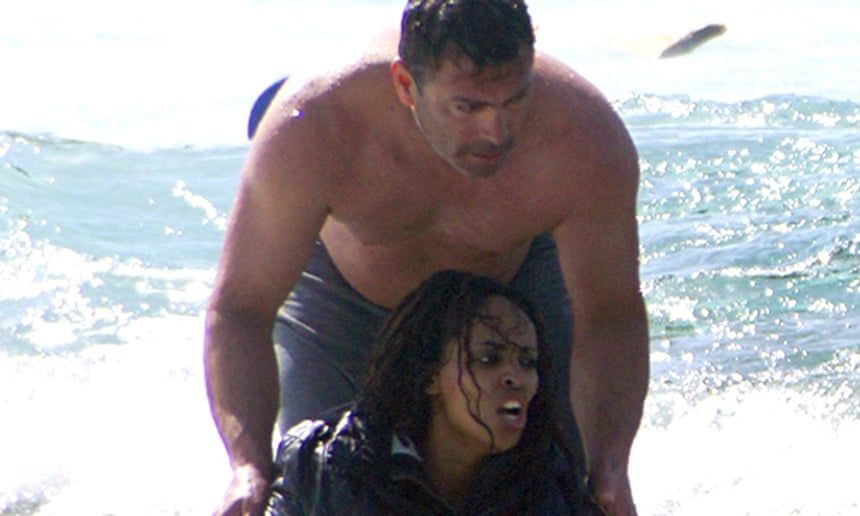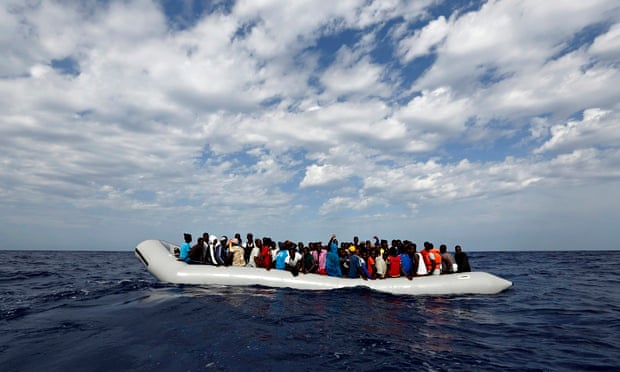It was an image that came to symbolise desperation and valour: the desperation of those who will take on the sea – and the men who ferry human cargo across it – to flee the ills that cannot keep them in their own countries. And the valour of those on Europe’s southern shores who rush to save them when tragedy strikes.
Last week on the island of Rhodes, war, repression, dictatorship in distant Eritrea were far from the mind of army sergeant Antonis Deligiorgis. The world inhabited by Wegasi Nebiat, a 24-year-old Eritrean in the cabin of a yacht sailing towards the isle, was still far away.
At 8am on Monday there was nothing that indicated the two would meet. Stationed in Rhodes, the burly soldier accompanied his wife, Theodora, on the school run. “Then we thought we’d grab a coffee,” he told the Observer in an exclusive interview recounting what would soon ensue. “We stopped by a cafe on the seafront.”
Deligiorgis had his back to the sea when the vessel carrying Nebiat struck the jagged rocks fishermen on Rhodes grow up learning to avoid. Within seconds the rickety boat packed with Syrians and Eritreans was listing. The odyssey that had originated six hours earlier at the Turkish port of Marmaris – where thousands of Europe-bound migrants are now said to be amassed – was about to end in the strong currents off Zefyros Beach.
For Nebiat, whose journey to Europe began in early March – her parents paid $10,000 for a voyage that would see her walk, bus and fly her way to “freedom” – the reef was her first contact with the continent she had prayed to reach. Soon she was in the water clinging to a rubber buoy.
“The boat disintegrated in a matter of minutes,” the father-of-two recalled. “It was as if it was made of paper. By the time I left the café at 10 past 10, a lot of people had rushed to the scene. The coastguard was there, a Super Puma [helicopter] was in the air, the ambulance brigade had come, fishermen had gathered in their caiques. Without really giving it a second’s thought, I did what I had to do. By 10:15 I had taken off my shirt and was in the water.”
Deligiorgis brought 20 of the 93 migrants to shore singlehandedly. “At first I wore my shoes but soon had to take them off,” he said, speaking by telephone from Rhodes. “The water was full of oil from the boat and was very bitter and the rocks were slippery and very sharp. I cut myself quite badly on my hands and feet, but all I could think of was saving those poor people.”
In the chaos of the rescue, the 34-year-old cannot remember if he saved three or four men, or three or four children, or five or six women: “What I do remember was seeing a man who was around 40 die. He was flailing about, he couldn’t breathe, he was choking, and though I tried was impossible to reach. Anyone who could was hanging on to the wreckage.”
Deligiorgis says he was helped by the survival skills and techniques learned in the army: “But the waves were so big, so relentless. They kept coming and coming.” He had been in the water for about 20 minutes when he saw Nebiat gripping the buoy. “She was having great problems breathing,” he said. “There were some guys from the coastguard around me who had jumped in with all their clothes on. I was having trouble lifting her out of the sea. They helped and then, instinctively, I put her over my shoulder.”
 The rescue operation on the Greek island of Rhodes. Photograph: Xinhua /Landov / Barcroft Media/Xinhua /Landov / Barcroft Media
The rescue operation on the Greek island of Rhodes. Photograph: Xinhua /Landov / Barcroft Media/Xinhua /Landov / Barcroft Media
On Friday it emerged that he had also rescued a woman who gave birth to a healthy baby boy in Rhodes general hospital. In a sign of her gratitude, the Eritrean, who did not want to be identified, told nurses she would name her son after him. While Deligiorgis’s heroism has raised the spirits of a nation grappling with its worst economic crisis in modern times, he is far from alone. All week there have been stories of acts of kindness, great and small, by islanders who rushed to help the emigrés. One woman stripped her own child to swaddle a Syrian baby, hundreds rushed to donate food and clothes.
“They are souls, like us,” said Babis Manias, a fisherman, breaking down as he recalled saving a child.
“We couldn’t believe it at first. We thought it was a tourist boat, what with all the hotels along the beach. I’ve never seen anything like it, the terror that can haunt a human’s eyes.”
The incident has highlighted the extraordinary sacrifice people on the frontline of Fortress Europe will often make as the humanitarian disaster unfolding on the continent’s outer reaches becomes ever more real. Last week close to 2,000 migrants were reported entering he country with the vast majority coming through its far-flung Aegean isles. Most were said to be Syrian students and other professionals able to afford passage to the west.
“As long as there are crises in their own countries and desperation and despair, they will look to Europe,” said Giorgos Tsarbopoulos, who heads the United Nations refugee mission in Athens. “And as long as there are no legal alternatives they will take these great risks to get here.”
Like other passengers, Nebiat, who would spend most of the week in hospital being treated for suspected pneumonia, has no desire to stay in Greece. Sweden is her goal. And on Thursday she boarded a ferry bound for Piraeus, the continuation of a journey that began in the Eritrean capital of Asmara, took her to Sudan and from there to Turkey travelling on a fake passport. “I am lucky,” she said as she was reunited with those who made the journey with her. “Very lucky to be alive.”
Deligiorgis falls silent at the mention of heroism. There was nothing brave, he says, about fulfilling his duty “as a human, as a man”. But recounting the moment he plucked the Eritrean from the sea, he admits the memory will linger. “I will never forget her face,” he says. “Ever.”



















































